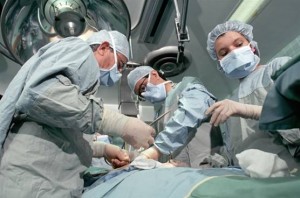Healthcare Advocates Respond to Congressman’s Position on Morcellation

Questions have been raised recently about the safety of power morcellators used during gynecologic surgeries, with some healthcare advocates calling for a complete ban on the medical devices because of the risk of spreading cancer during morcellation. Adding fuel to the fire, Congressman Michael Burgess, a Tea Party Republican from Texas, has publicly stated that it’s the surgeons who are to blame for the problem, not the power morcellators themselves. The congressman’s insistence that the devices are safe is particularly puzzling, given that he is a former gynecologist.
Risks of power morcellation
Power morcellators may be used during minimally invasive gynecologic surgeries such as hysterectomies and myomectomies to remove the uterus or uterine fibroids, respectively. The devices grind up the fibroids or reproductive organs so that the surgeon can remove them through small incisions, instead of having to make a large incision that can lengthen the patient’s recovery time. However, consumer advocates have grown increasingly alarmed about their use, since some women undergoing the surgery may be unaware that they have localized or in situ cancer.
The risk of morcellation, in these cases, is that the cancer cells can be quickly spread throughout the region, which accelerates staging of the cancer and worsens the prognosis.
However, Congressman Burgess is of the opinion that it’s the surgeons to blame for the spread of cancer, not the power morcellators, despite his statement that he has never used nor does he currently use power morcellators in his gynecology practice. When denying the risk of cancer with power morcellators, he offered this view, “Every doctor who operates on the abdomen knows that if there is a Stage 1 encapsulated tumor, that disrupting the capsule could make the cancer spread. I think it was clinical judgement at fault, not the FDA’s approval process.”
The congressman’s statements appear to conflict with the FDA’s official position. Late in 2014, the FDA issued a safety communication that estimated about one in 350 women who undergo these surgeries could have an unsuspected uterine sarcoma.
The safety communication went on to note that, “At this time, there is no reliable method for predicting or testing whether a woman with fibroids may have a uterine sarcoma… Because of this risk and the availability of alternative surgical options for most women, the FDA is warning against the use of laparoscopic power morcellators in the majority of women (who are undergoing surgery).”
Despite its concerns, the FDA stopped short of issuing a power morcellator recall.
Fitzpatrick amendment killed in Congress
Congressman Burgess’ comments came on the heels of the failed attempt by Congressman Fitzpatrick (R-Pennsylvania) to add an amendment to the 21st Century Cures Act. Congressman Fitzpatrick, who is a cancer survivor, proposed requiring that patients’ electronic health records (EHRs) include unique device identifier numbers, which would allow healthcare providers to know exactly which medical devices were used on a patient. This amendment was inspired by the growing public concern over the risk of cancer metastasis from power morcellators.
However, the amendment was killed in committee by none other than Congressman Burgess.
The Dallas Observer noted that Congressman Burgess’ campaign contributions included a $5,000 contribution from Johnson & Johnson, which is one of the manufacturers of power morcellators.
- The Dallas Observer, U.S. Rep. Michael Burgess Blames Doctors, not FDA, for Medical Device's Danger, http://www.dallasobserver.com/news/us-rep-michael-burgess-blames-doctors-not-fda-for-medical-devices-danger-7419158
- FDA, UPDATED Laparoscopic Uterine Power Morcellation in Hysterectomy and Myomectomy: FDA Safety Communication, http://www.fda.gov/MedicalDevices/Safety/AlertsandNotices/ucm424443.htm


 Resources
Resources
 Resources
Resources
